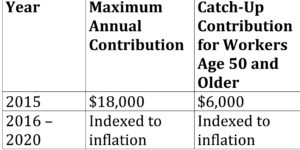Americans are living longer, healthier lives, and this trend is affecting how they think about and plan for retirement. For instance, according to the Employee Benefit Research Institute, the age at which workers expect to retire has been rising slowly over the past couple of decades. In 1991, just 11% of workers expected to retire after age 65. Fast forward to 2014, and that percentage has tripled to 33% — and 10% don’t plan to retire at all.1
Working later in life can offer a number of advantages. Many people welcome the opportunity to extend an enjoyable career, maintain professional contacts, and continue to learn new skills.
A Financial Boost
In addition to personal rewards, the financial benefits can go a long way toward helping you live in comfort during your later years. For starters, staying on the job provides the opportunity to continue contributing to your employer-sponsored retirement plan. And if your employer allows you to make catch-up contributions, just a few extra years of saving through your workplace plan could give your retirement nest egg a considerable boost, as the table below indicates.
A Few Extra Years Could Add Up

Delaying Distributions
In addition to enabling you to continue making contributions to your employer’s plan, delaying retirement may allow you to put off taking distributions until you do hang up your hat. Typically, required minimum distributions (RMDs) are mandated when you reach age 70 1⁄2, but your employer may permit you to delay withdrawals if you work past that age.
Keep in mind that if you have a traditional IRA, you are required to begin RMDs by age 70 1⁄2, while a Roth IRA has no distribution requirements during the account holder’s lifetime — a feature that can prove very attractive to individuals who want to keep their IRA intact for a few added years of tax-deferred investment growth or for those who intend to pass the Roth IRA on to beneficiaries.
A Look at Social Security
Your retirement age also has a significant bearing on your Social Security benefit. Although most individuals are eligible for Social Security at age 62, taking benefits at this age permanently reduces your payout by 20% to 30% or more. Waiting until your full retirement age — between 66 and 67 — would allow you to claim your full unreduced benefit. And for each year past your full retirement age you wait to claim benefits, you earn a delayed retirement credit worth 8% annually up until age 70.2 Consider researching your options to continue working past the traditional retirement age. By remaining on the job, your later years may be more secure financially and more rewarding personally.




